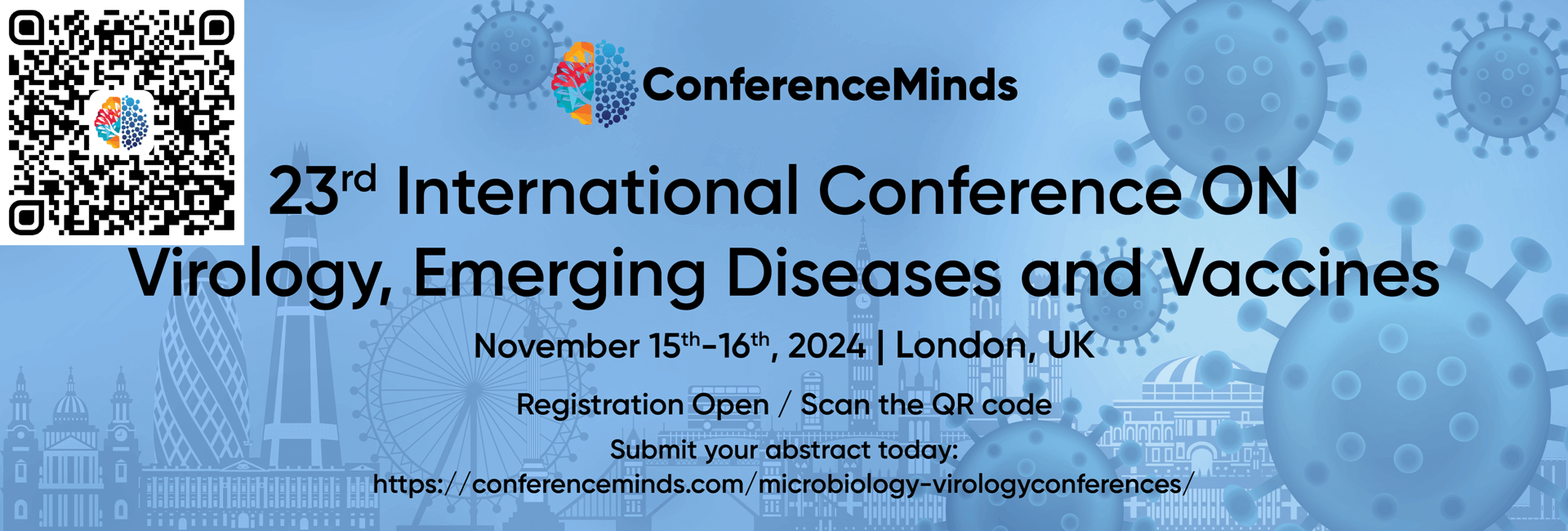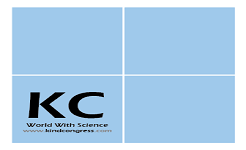
23rd International Conference
ON
Virology, Emerging Diseases and Vaccines
Event Date
November 15-16, 2024
Venue
London, UK
– Previous Conference Performers / Professionals From Around The Globe –

Ahmed Ali
- Diyala University, Iraq

Aikaterini Ziaka
- Physio4you, Greece

AMR Hawal
- Professor, Prime Healthcare Group UAE

Antonio Steardo
- University of Salerno, Italy

Ashraf Lotfy Fayed
- ENT Military Hospital, Egypt

Aspazija Sofijanova
- Director of Pediatric Clinic, Macedonia

Brandon P. Lucke-Wold
- University of Florida, Florida

Brankica Vasiljevic
- NMC Royal Hospital, UAE

Bruce Ogden
- Director of Operations US Foods USA

Cornelia Beyer
- University of Hull, UK

Gabriela Barsov
- Macedonia

Grazzia Rey
- University of the Republic, Uruguay

Hadi Salloum
- UAE

Heather Carmello
- University of Rochester, USA

Howard Weber
- Penn State Hershey Childrens Hospital, USA

Ilknur AydınAvci
- Turkey

Irene Hamrick
- University of Cincinnati, USA

José De Jesús Curiel Valdés
- Clínical Patology, Mexico

Lloyd L. Tran
- Biomed Industries, USA

Luca Roncati
- University Hospital of Modena, Italy

Mahmoud Al Cheikh Ahmad
- UAE

Maria Braoudaki
- University of Hertfordshire , United Kingdom

Marina F Gubkina
- National Research Medical University, Russia

Muhamad Akhal
- UAE

Peter Krcho
- Pavol Jozef safarik University, Slovakia

Pinghong Zhou
- Fudan University, China

Raffaele Pilla
- University of Salerno, Italy

Ruut Veenhoven
- Seres Therapeutics, United States

Said Moustafa M. El-deib
- Yas Clinic Khalifa City UAE

Sajidxa Marino
- Central University of Venezuela, Venezuela

Sajidxa Marino
- Central University of Venezuela, Venezuela

Sam Vaknin
- Southern Federal University, Russia

Sandra Vélez Candelario
- Catholic University of Puerto Rico, USA

Simon Treissman
- Royal Inland Hospital, Canada

Taylor Bean
- Salmon Arm, Canada

Thiago Hoesker
- Neuro surgeon , Brazil

Tracy Roake
- Danat Al Emarat Hospital, UAE

Vladimir Zajac
- Cancer Research Institute, Slovakia

William J Rowe
- Specialist in Medicine, USA

Yu You Liu
- National Chung Hsing University, Taiwan
Media Partners/Collaborator
A huge thanks to all our amazing partners. We couldn’t have a conference without you!










Sponsors/Exhibitors
A huge thanks to all our amazing partners. We couldn’t have a conference without you!


Virology 2024
With great pleasure ConferenceMinds welcome all the participants across the World to attend the “23rd International Conference on Virology, Emerging Diseases and Vaccines” going to be held on November 15-16, 2024 in London, UK
Theme: Novel Researches in Virology, Emerging Diseases and Vaccines
This conference provides a firm platform for scientists, researchers, professors, engineers, and directors of various companies, industrial professionals, and students in the field of microbiology, virology and Vaccines, and other related fields to share their knowledge. We also take massive pleasure in welcoming various professionals from distinct countries all over the world.
Virology 2024 is an international platform for building research works and therapeutic findings and disorders related to microbial diseases, viruses, and infections caused by bacteria, and fungi. These types of diseases may be caused due to water-borne, food-borne, and airborne in human beings as well as in plants and animals. When it comes to microbiology and virology microbes are characterized as the heart of most of the solutions to the pressing problems in the world. It also represents the increasing importance of human mortality around the globe; thereby vaccination and vaccine development plays a significant role in terms of global health.
Target Audience
- Directors, Board Members, Presidents, Vice Presidents
- Deans and Head of the Departments
- Business Entrepreneurs and Industrialists
- Microbiologist
- Virologists
- Parasitologist
- Bacteriologist
- Pharmacists
- Epidemiologists
- Dermatologists
- Neurologist
- Ophthalmologist
- Cardiologist
- Infectious Diseases Researchers, Scientists, Faculties, Students
- Infectious Diseases Associations and Societies
- Medical Colleges, Hospitals & Labs
- Pharmaceutical Companies and Industries
- Medical devises Manufacturing Companies
- Drug Manufacturing Companies and Industries
Session and Tracks
Track 1: Microbiology
Microbiology delves into the realm of minuscule life forms, encompassing bacteria, fungi, and viruses that elude naked-eye detection. It serves as the cornerstone for developing vaccines and treatments combating various diseases. Within this domain, biologists pioneer innovative methods to tackle illnesses, while microbiologists spearhead efforts in product development aimed at eradicating viruses and bacteria.
- Microbes and their role in disease
- Diverse branches of microbiology
- Applications driving advancements in medicine
Track 2: Clinical Microbiology
Clinical Microbiology stands at the forefront of medical science, addressing the diagnosis, treatment, and prevention of infectious diseases. It plays a pivotal role in patient care, furnishing crucial insights into infection causes and antimicrobial susceptibilities. By employing diverse analytical methods, clinical microbiologists identify and isolate microbes, facilitating swift pathogen diagnosis imperative for effective antibiotic administration.
- Isolation and characterization techniques
- Clinical trial methodologies
- Expansive scope within healthcare
Track 3: Microbes and Infectious Diseases
Microbes, though not uniformly harmful, encompass a spectrum of pathogens capable of jeopardizing human health. Categorically, infectious diseases span from pediatric to adult afflictions, often disseminating via various transmission routes. Understanding their modes of proliferation, from vector-borne to airborne dissemination, underscores the paramount importance of delineating distinct strategies for disease containment and mitigation.
- Pediatric and adult infectious diseases
- Different modes of disease transmission
Track 4: Pediatric Infectious Diseases
Pediatric Infectious Diseases constitute a subset of medical concerns exclusively affecting infants and children. Ranging from common ailments like influenza to severe conditions such as HIV/AIDS, these infections pose significant challenges to pediatric healthcare. Heightened vigilance is warranted to address persistent fevers and recurrent infections, safeguarding the well-being of the pediatric population.
- Noteworthy pediatric infectious diseases
Track 5: Adult Infectious Diseases
Adult Infectious Diseases manifest in individuals aged 18 and above, encompassing a gamut of bacterial, fungal, and viral afflictions. From HIV/AIDS to antibiotic-resistant infections like MRSA, these maladies impose substantial health risks, necessitating comprehensive preventative measures and therapeutic interventions.
- Examples of adult infectious diseases
Track 6: Airborne and Direct Contact Diseases
Airborne and Direct Contact Diseases pose unique challenges in disease transmission dynamics. While airborne pathogens propagate through respiratory droplets, direct contact transmission necessitates physical interaction between infected and uninfected individuals. Vigilance against afflictions such as influenza and tuberculosis mandates stringent infection control protocols to curtail disease dissemination.
- Notable airborne and direct contact diseases
Track 7: Virology
Virology delves into the intricate world of viruses, exploring their structural composition, evolutionary dynamics, and pathogenic mechanisms. From elucidating host-virus interactions to harnessing viral agents for therapeutic purposes, this discipline navigates diverse facets of virological research, spanning from classification to therapeutic applications.
- Insights into viral structure and classification
- Diseases and host immune responses
- Cutting-edge molecular biology research
Track 8: Human Virology and Infectious Diseases
Human Virology intersects with the broader landscape of infectious diseases, encompassing pathogens like HIV, hepatitis B and C, and human papillomavirus (HPV). Addressing these infections demands concerted efforts in prevention, diagnosis, and treatment, with a focus on bolstering immune responses and curtailing disease transmission.
- Noteworthy human viral infections
Track 9: Vector Borne and Zoonotic Infectious Diseases
Vector Borne and Zoonotic Infectious Diseases present formidable challenges, often bridging the gap between animal hosts and human populations. From avian flu to malaria, these diseases underscore the intricate interplay between vectors, pathogens, and human susceptibility, necessitating multifaceted intervention strategies for disease control.
- Prominent vector borne and zoonotic diseases
Track 10: Food and Water Borne Diseases
Food and Water Borne Diseases epitomize the intersection between microbial contamination and human consumption. From travelers’ diarrhea to cholera, these ailments underscore the imperative of stringent food and water safety measures, mitigating the risk of gastrointestinal infections and their associated morbidities.
- Common food and water borne diseases
Track 11: Viral Oncology
Viral Oncology explores the intricate nexus between viral infections and oncogenic processes, elucidating the role of oncoviruses in cancer pathogenesis. From human oncoviruses to classification schemes, this field delves into the molecular mechanisms underpinning viral-induced malignancies, paving the way for innovative therapeutic strategies.
- Human oncoviruses and their implications
Track 12: Bacterial and Viral Vaccines
Bacterial and Viral Vaccines epitomize the cornerstone of preventative medicine, harnessing the immune system to confer protection against infectious agents. From pneumococcal to polio vaccines, these immunological interventions underscore the pivotal role of vaccination in disease eradication and public health promotion.
- Notable bacterial and viral vaccines
Track 13: Epidemiology of Infectious Diseases
Epidemiology of Infectious Diseases elucidates the intricate patterns of disease transmission, encompassing diverse methodological approaches from outbreak investigation to disease surveillance. By dissecting epidemiological characters, this field informs targeted interventions, shaping public health policies and fostering disease control initiatives.
- Methodologies in infectious disease epidemiology
Track 14: Antibiotics/Antimicrobial
Antibiotics and Antimicrobial agents constitute indispensable tools in combating microbial infections, wielding bactericidal or bacteriostatic effects to curtail pathogen proliferation. From disinfectants to role of antibiotics in specialized surgical procedures, these agents underscore the multifaceted arsenal of antimicrobial therapy.
- Classes of antimicrobial agents
Track 15: Rare, Neglected & Tropical Infectious Diseases
Rare, Neglected & Tropical Infectious Diseases spotlight the plight of marginalized populations facing endemic afflictions. From malaria to Chagas disease, these maladies underscore the imperative of global health equity, demanding concerted efforts in research, surveillance, and intervention to alleviate disease burdens.
- Noteworthy neglected tropical diseases
Track 16: Bacterial and Fungal Infectious Diseases
Bacterial and Fungal Infectious Diseases traverse the spectrum of microbial pathogenesis, from benign commensals to virulent pathogens. Addressing diverse bacterial diseases and fungal infections necessitates tailored therapeutic approaches, underpinned by comprehensive diagnostic modalities and antimicrobial stewardship.
- Clinical manifestations and classifications
Track 17: Infection and Immune System
Infection and Immune System delineate the intricate interplay between pathogens and host defenses, encompassing innate and adaptive immune responses. From natural barriers to nonspecific cells, this field elucidates the multifaceted mechanisms underpinning host-pathogen interactions, shaping disease outcomes and therapeutic interventions.
- Dynamics of innate and adaptive immunity
Track 18: Diagnosis and Treatment of Infectious Diseases
Diagnosis and Treatment of Infectious Diseases hinge upon accurate diagnostic modalities and tailored therapeutic regimens. From symptomatic diagnosis to cutting-edge PCR-based diagnostics, this track underscores the pivotal role of timely interventions in curbing disease progression and fostering patient recovery.
- Modalities in disease diagnosis and treatment
Track 19: Microbial Vaccines and Advancements
Microbial Vaccines and Advancements underscore the ever-evolving landscape of vaccine development and immunological research. From hepatitis B to polio vaccines, this track delineates groundbreaking advancements in vaccine-mediated immunity, heralding a new era in infectious disease prevention and control.
- Noteworthy vaccine developments and innovations
Track 20: Medical, Clinical and Diagnostic Virology
Medical, Clinical and Diagnostic Virology unravel the complexities of viral pathogenesis and clinical manifestations, leveraging diverse diagnostic modalities to elucidate disease etiology and inform therapeutic interventions. From diagnostic methodologies to antiviral susceptibility testing, this track embodies the frontline of virological research and clinical practice.
- Advancements in diagnostic virology
Track 21: Prevention, Control and Treatment of Infectious Diseases
Prevention, Control and Treatment of Infectious Diseases epitomize the cornerstone of public health, encompassing a holistic approach to disease containment and mitigation. From hand hygiene to IPC strategies combating antimicrobial resistance, this track underscores the imperative of proactive interventions in safeguarding global health.
- Strategies in disease prevention and control
Track 22: Novel Coronavirus (COVID-19)
Novel Coronavirus (COVID-19) signifies a global health crisis, necessitating concerted efforts in disease surveillance and containment. From symptomatology to preventive measures, this track elucidates the evolving landscape of COVID-19 research and public health interventions, underscoring the imperative of global solidarity in combating this unprecedented threat.
- Symptoms and preventive measures against COVID-19
Market Analysis
Virology 2024 is anticipated to be a pivotal event, reflecting the ongoing challenges and advancements in the field of infectious diseases. Market analysis suggests a sustained demand for forums that address infectious diseases, given the persistent global threats posed by emerging infections, antimicrobial resistance, and the need for rapid responses to outbreaks.
The market for infectious diseases conferences is expanding due to various factors. The ongoing impact of the COVID-19 pandemic, coupled with the threat of other infectious diseases, highlights the importance of knowledge-sharing and collaboration among healthcare professionals, researchers, and policymakers. This conference is expected to attract a diverse audience, including infectious disease specialists, microbiologists, epidemiologists, and representatives from public health agencies.
Key drivers for the growth of this market include the continuous evolution of infectious diseases, the need for effective surveillance and diagnostic tools, and the development of novel therapeutics and vaccines. The Infectious Diseases Conference serves as a crucial platform for disseminating the latest research findings, discussing public health strategies, and fostering global collaboration to address infectious disease challenges.
Pharmaceutical companies, biotech firms, and diagnostic technology providers often leverage the conference to showcase their contributions to infectious disease management. As infectious diseases remain a significant global health concern, the market for conferences in this field is expected to witness sustained growth. The conference will likely play a vital role in advancing our understanding of infectious diseases and facilitating the collaboration necessary to mitigate their impact on public health.
– Tracks & Key Topics –
- COVID 19
- Microbiology
- Clinical Microbiology
- Microbes and Infectious Disease
- Virology
- Clinical Pathology
- Bacterial and Viral Vaccines
- Medical Microbiology
- Food Microbiology
- Industrial Microbiology
- Microbial Genetics
- Microbial Laboratory
- Mycology
- Bacteriology
- Diagnosis and treatment of infectious disease
- Trends in cellular Microbiology
- Applied Microbiology
- Environmental Microbiology
- Medical Microbiology
- Pharmaceutical Microbiology
- Food and Dairy Microbiology
- Forensic Microbiology
- Rare, Neglected & Tropical Infectious diseases
- Bacterial and Fungal Infectious Diseases
- Infection and Immune System
- Diagnosis and Treatment of Infectious Diseases
- Microbial Vaccines and Advancements
- Medical, Clinical and Diagnostic Virology
- Novel Coronavirus (Covid-19)
- Vector Borne and Zoonotic Infectious Diseases
- Food and Water Borne Diseases
- Viral Oncology
- Bacterial and Viral Vaccines
- Epidemiology of Infectious Diseases
- Antibiotics/ Antimicrobial
- Microbial Ecology and Evolution
- Profession of Microbiology
- Agriculture and Forest Microbiology
- Plant Pathology and Microbiology
- Veterinary Microbiology
- Aquatic and Marine Microbiology
- Environmental Microbiology (Soil Microbiology & Water Microbiology)
- Food Microbiology
- Molecular Biology and Physiology
- Medical Microbiology
- Host-Microbe Biology
- Applied and Environmental Science
- Industrial Microbiology, Microbial Biotechnology and Future Bioindustries
- Pharmaceutical Microbiology
- Clinical and Public Health Microbiology
- Clinical Infections and Vaccines
- Antimicrobial Agents and Resistance
- Industrial Microbiology
- Microbial Biotechnology
- Agricultural Microbiology
- Bioremediation
- Microbial Physiology and Biomolecules
- Microbial Gene Technology
- Microbial Biochemistry and Molecular Immunology
- Advances in Biomaterials
- Microbiology
- Clinical Microbiology
- Microbes and Infectious Diseases
- Pediatric Infectious Diseases
- Adult Infectious Diseases
- Airborne and Direct Contact Diseases
- Human Virology and Infectious Diseases
